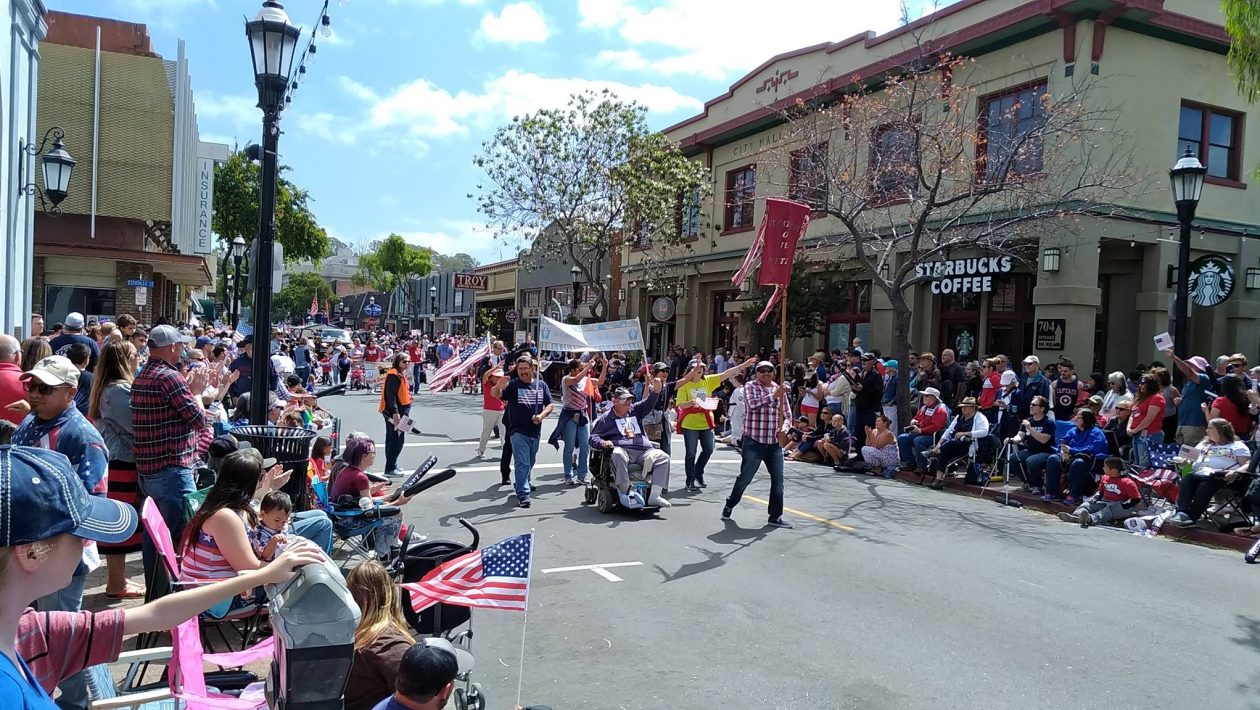Although City Manager Eric Figueroa has until June 4 to make the decision, he now has the authority to pull the plug on Martinez’s Fourth of July celebrations.
In a unanimous vote Wednesday, the City Council gave him the authority to cancel both the parade that attracts thousands to Martinez’s downtown area as well as the fireworks display that takes place at an usually filled to capacity Waterfront Park.
Martinez already has put a $9,386 deposit down for the fireworks show with its vendor, Pyrospectaculars by Souza. If Figueroa decides to cancel with 30 days’ notice, the city would get a refund of $1,336. After that, Martinez would be obligated to pay up to the full tab, even if the fireworks show did not take place.
The vendor offered Martinez the option to reschedule the fireworks show later in the year, when pandemic restrictions are expected to be reduced or lifted.
But that would put the event into California’s fire season, Recreation Supervisor Kara Galindo said Wednesday. If East Bay Regional Park District decides the show is a fire hazard, it would be prohibited and the city would be obligated for the entire cost, Galinda said.
Most other neighboring cities have canceled their events, and Galinda said if Martinez kept its celebration intact, it could expect crowds from those other cities.
“No one wants to cancel the events,” Figuero said, but he warned that keeping the parade and fireworks show on the calendar gives him many concerns.
“The last thing I want to do is cancel Fourth of July,” Mayor Rob Schroder said, adding that there was more to the decision than saving money. “We are in a different world,” he said. “I’ve got to look at reality.”
The rest of the Council concurred, citing the need to remain safe during the COVID-19 virus pandemic.
Money might not have been the motivation on that topic, but it was central to Finance Director David Glasser’s presentation on how the pandemic is affecting the current budget, which ends June 30.
Waiting in the wings is the development of the next budget, which needs to be in place July 1, but discussion of that proposed document will take place at a future meeting, Figueroa said Wednesday.
Instead, he and Glasser sought Council comments on suggested changes to the current budget as the city gears up to address the impacts the pandemic will have on its revenues and expenses.
Some members of the Council chided the two for giving them a wealth of hard numbers the same day as the meeting, which took place through the Zoom application. That gave little time for analysis they needed to give the requested feedback, said Councilmembers Noralea Gipner and Lara DeLaney and Vice Mayor Mark Ross.
Normally, the information first would go to the Council Finance Subcommittee, but because of the pandemic’s impact, city staff decided this time to present the information to the full Council, Figueroa said.
The city has been cutting costs by having employees work from home during City Hall’s closure. It’s canceled programs and reduced discretionary spending. Vacant positions have not been filled, Glasser said.
General Fund income from taxes, licenses, service charges property and other sources are projected to be $1,039,210 lower than the budgeted $27,318,237, Glasser said in his report. The General Fund is the city’s operating budget, its “checkbook,” he said.
A few tax sources remain stable or are slightly ahead of expectations, such as property taxes, business license taxes, franchise fees, and the VLF property tax swap.
Sales and use taxes are expected to drop 5 percent from the budgeted $4.326 million. But the document transfer tax is expected to drop from $232,800 to $182,800, a 21 percent decline, and the Transient Occupancy Tax, from hotel room rentals, is expected to be 47 percent lower than budgeted, $515,000 to $275,000.
Fortunately, the city had budgeted conservatively for its own sales tax receipts from Measure X and Measure D, which provide general fund and road repair revenues.
Martinez also is expecting $525,000 in transfer tax revenue from the sale of the Martinez Shell Refinery to PBF, and has $300,000 in borrowed money left over from settling a Social Security debt incurred after the dissolution of its joint facilities agreement with Pleasant Hill. Returning the borrowed money would incur penalties, the Council learned.
But the pandemic restrictions are likely to have negative impacts through Fiscal Year 2021, Glasser warned.
Because many people have parked their cars, demand for fuel will reduce sales tax and state transportation money as well, he said. No significant revenue is expected through June from the hotel occupancy tax, construction and development, rentals or recreation programs.
Nor is anticipated revenue coming from downtown parking meters, the marina businesses or from late or restoration fees from the water service.
The city must prepare to adjust its cash flow because businesses have received extensions for filing returns less than $1 million and others are taking advantage of the Small Business Relief Payment 12-month installment plan. Those will affect sales tax receipts, but the city should benefit from the Wayfair Decision that requires online transactions to pay sales tax, he said.
Costs to run the government keep going up, however, expected to be $27,063,577 instead of the expected $26,958,947
The city has managed to cut an expected $130,470 from its $4,158,834 administrative services budget and another $362,580 from its $1,972,663 Community Development budget. Non-department expenses are expected to be $17,700 lower than the budgeted $2,357,336.
Some cuts in the current budget are because some projects have been delayed, such as the Marina Master Plan, a zoning code amendment, several studies and a cannabis ballot measure.
But the city saw an additional $190,000 in unbudgeted litigation expenses even if it successfully defended its voting districts put in place after receiving a letter from Malibu attorney Kevin Shenkman that accused the city of violating the California Voting Rights Act by having at-large Council elections. The Council made the change after conducting requisite hearings, but two residents, represented by Shenkman, challenged the design of the voting maps.
The Council agreed with Figueroa’s recommendation that the city use money from its reserves to pay for the additional legal expenses and that the money left over from the Social Security settlement to fund most of its share of a business loan program announced by the state.
Figueroa and Glasser will present the budget adjustments in a more complete form for Council consideration at a future meeting.
In other matters, and despite several objections from non-union construction spokespeople who addressed the meeting Wednesday, the Council adopted a Project Labor Agreement (PLA) with the Contra Costa County Building and Construction Trades Council.
The agreement is designed to minimize strikes and other work disruptions, and would apply to all contractors and subcontractors hired for a city project estimated to cost at least $1 million.
The Council unanimously approved final designs for four utility box beautification projects. They are Alexandra Riddle’s “Kites,” Louise Belle’s butterfly and caterpillar themed “Metamorphosis,” Colleen Gianatiempo’s “Love is Key” and Lollie Ortiz’s geometric “Interlock.”
The panel also authorized its staff to seek Federal Emergency Management Agency and California Office of Emergency Services for disaster aid to cover costs from the COVID-19 emergency and Local Early Action Planning grant money for an environmental review of a new zoning ordinance.
It maintained the same rates charged in its role as Board of Directors for the Contra Costa County Sanitation District No. 6 and in the municipal lighting and landscaping districts.






One Reply to “Martinez may cancel July 4 activities, eyes budget adjustments”